“I love my work but sometimes the most important thing in a whole day is the rest I take to catch a breath” –Zaituna Amuge

Thursday 17 th August 2023- After her day’s farming activities that include digging and tending to her livestock, prominent CAVA-supported farmer, Mrs. Zaituna Amuge Emutu, enjoys an afternoon chill and chats with a fellow farmer at her home compound in Bukedea district, Eastern Uganda. Zaituna is the Chairperson of the Popular Knowledge Women Initiative (P’KWI) farmer group that was discovered back in 2005 by the CAVA project that supported and trained them in the processing of High-Quality Cassava Flour (HQCF), baking, and extensive cassava production. The CAVA Project reached and benefitted over one million farmers (1M), many of these being women and youth from Central, Eastern and Northern Uganda.

Zaituna merrily tends to her cattle on her farm home in Bukedea District, Eastern Uganda
AfrII extends a vote of gratitude to The Bill and Melinda Gates Foundation for funds provided to ensure the effective and smooth implementation of the CAVA Project. We also extend a vote of appreciation to the Natural Resources Institute, University of Greenwich through whom the funds were provided. Lastly, we also recognize the efforts of fellow implementing countries, Nigeria, Tanzania, Ghana, and Malawi for the impact recorded on CAVA interventions at the country level.
AfrII to deliver working policies aimed to strengthen the National Agricultural Research System (NARS) of Lesotho
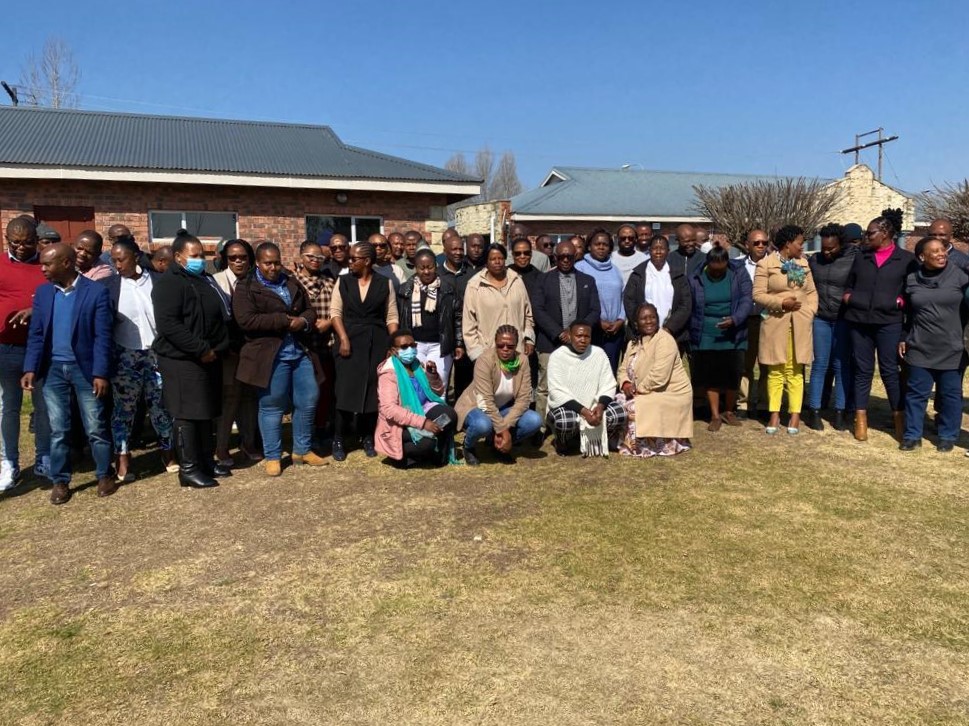
Participants at the Agricultural Research Planning Workshop at DAR, Lesotho pose for a group photo
Monday 14th /08/ 2023- A team of consultants from Uganda led by the AfrII CEO, Prof. George William Otim-Nape is currently engaged in a series of activities and meetings with the Kingdom of Lesotho including the recent Agricultural Research Planning Workshop at DAR and a Priority Setting Planning Workshop at Victory Hall, Maseru-Lesotho. The Kingdom of Lesotho’s Ministry of Agriculture and Food Security through the Department of Agricultural Research (DAR) hired the experts from Africa Innovations Institute (AfrII) to deliver consultancy services for the joint ‘Agricultural Productivity Programme for Sothern Africa’ project. This team is expected to develop strategies and working policies to strengthen the National Agricultural Research System (NARS) of Lesotho through research and innovation development.
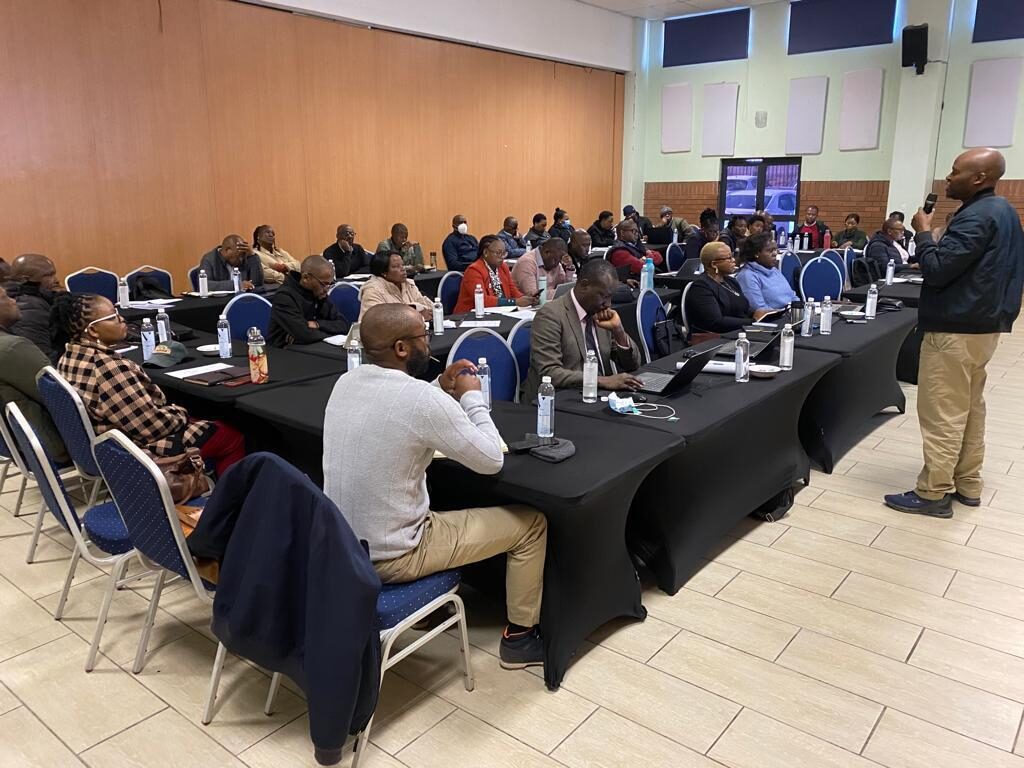
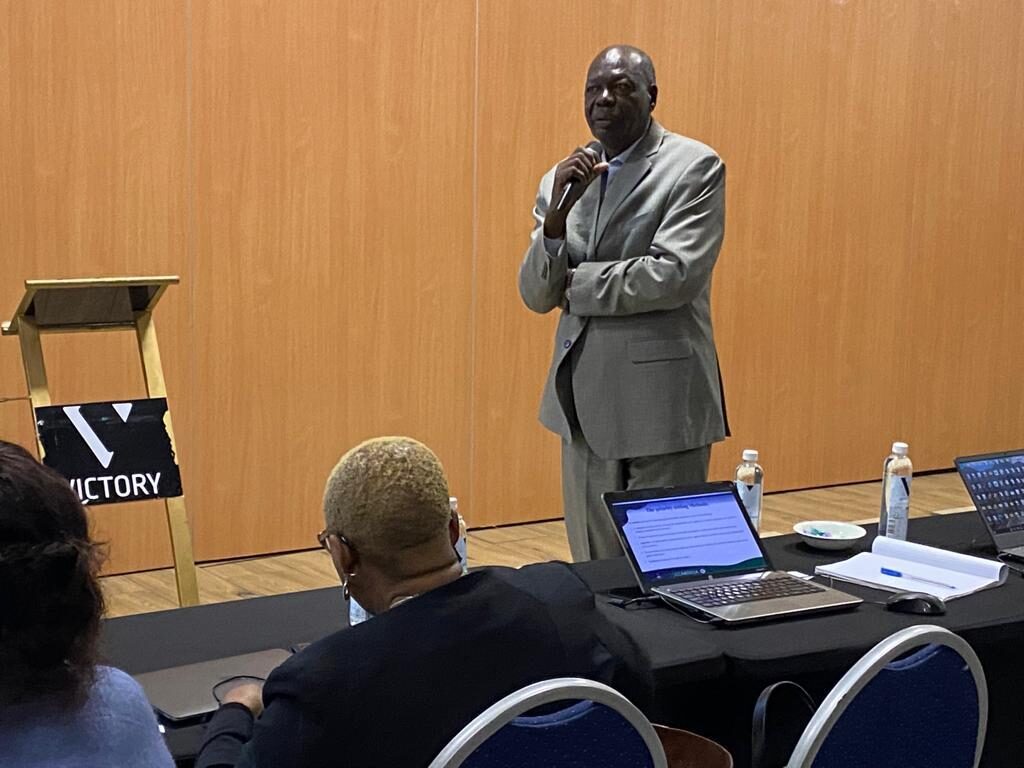
World Breastfeeding Week Kicks Off
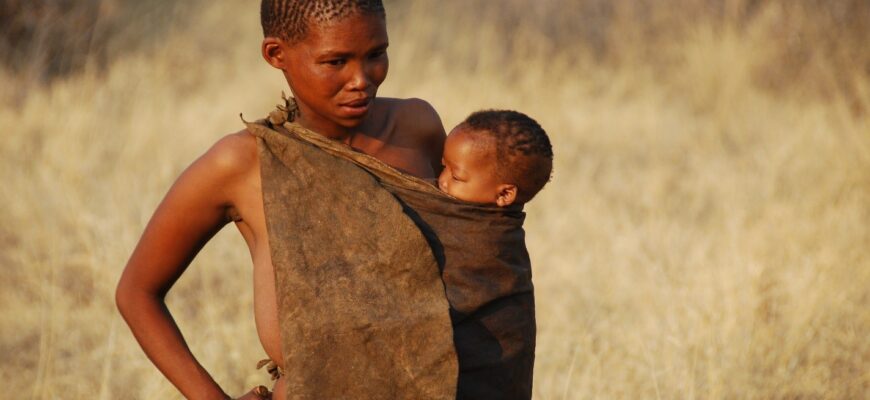
Tuesday 1st /08/2023 -Today, World BreastFeeding Week has commenced under the theme “Enabling Breastfeeding: Making a difference for working parents”. It is argued that there is a limited enabling environment for working mothers to sufficiently breastfeed their infants which affects child development. This breastfeeding week of 1st– 7th August, let us, therefore, all join in to emphasize the need for an enabling work environment to ensure that working mothers on the job play their role and feed their infants as is required.
DID YOU KNOW THAT:
Over 820,000 children’s lives could be saved every year among children under 5 years if all children 0–23 months were optimally breastfed.?
Breastfeeding improves IQ, and school attendance, and is associated with higher income in adult life?
Infant and young child feeding is a key area to improve child survival and promote healthy growth and development?.
WorldBreastFeedingWeek theme: “Making a difference for working parents”
(Source: WORLD HEALTH ORGANIZATION (WHO)
AfrII Engages Key Stakeholders in the Development of the CBIT Phase Two Project Document
 Friday 21st/07/2023-The National Stakeholders Consultation Workshop for the Preparation of the Second Phase of the Capacity Building Initiative for Transparency II (CBIT II) was held to create stakeholder awareness about the CBIT II Project and determine stakeholder feedback mechanisms for providing further information to the project preparation process. Consultants from Green Approaches Limited facilitated the two-day workshop organized by AfrII at the Royal Suites Hotel, Bugolobi from the 19th to the 20th of July 2023.
Friday 21st/07/2023-The National Stakeholders Consultation Workshop for the Preparation of the Second Phase of the Capacity Building Initiative for Transparency II (CBIT II) was held to create stakeholder awareness about the CBIT II Project and determine stakeholder feedback mechanisms for providing further information to the project preparation process. Consultants from Green Approaches Limited facilitated the two-day workshop organized by AfrII at the Royal Suites Hotel, Bugolobi from the 19th to the 20th of July 2023.
CBIT II will build on the great successes of CBIT I’s ‘Strengthening Capacity of Institutions in Uganda to Comply with Transparency Requirements of the Paris Agreement’ project. Under CBIT I, over 80 people were sensitized and trained on GHGI and MRV, Gender focal points were established in 5 sector hubs, the Uganda MRV portal was developed, and 6 sector GHG inventories were developed, among other achievements recorded. CBIT I was funded by the GEF-CI and implemented by AfrII and the Ministry of Water and Environment- Climate Change Department (CCD).
“This workshop is crucial because it highlights the importance of using previous technical expertise and since most of you here have been previously involved in CBIT I, I am confident that this will help us quickly build on what was done and do more on CBIT II. AfrII extends sincere appreciation to the Global Environment Facility and Conservation International for funds availed for the successful implementation of CBIT I. AfrII pledges to support the project as expected and appeals to all actors to similarly fully commit so as to deliver a successful CBIT Phase II project.” The remarks were made by AfrII’s Dr. Ben Fungo on behalf of the AfrII CEO- Prof. Otim-Nape.
In her remarks delivered by the Ministry of Water and Environment-CCD’s Ms. Irene Chekwoti, the Commissioner of Climate Change Ms. Margaret Athieno Mwebesa stated “Uganda benefitted from the CBIT I and made notable progress in enhancing the capacity of national institutions on monitoring, reporting, and verification of emissions. The Ministry is very confident that CBIT II will make an even greater impact on tracking and reporting on Uganda’s GHG emissions. The Ministry extends appreciation to our partners Conservation International and AfrII for joining efforts to seek this support from the international climate finance institutions to benefit Uganda.”
AfrII and MWE wish to jointly extend appreciation to the consultants leading the process of putting together all our ideas into a compelling fundable proposal for the CBIT II project.
Increasing youth inclusion in value chain agribusiness ventures
Representatives of Windwood Millers Limited (WML), at the, just concluded quarterly meeting for the end of the 2nd quarter of implementing the AfrII- WML- PSFU YAW Project titled ‘Increasing Income and Creating Job Opportunities for Youth in the Cassava Value Chain’. The project aims to create 5,214 decent and sustainable jobs for youths through the production and sale of 144,000 MTs of fresh cassava roots, and 6,000 MTs of soybeans, to WindWood Millers Ltd for processing into high-quality flour and other products for the markets. This project will enable WML to expand and stabilize its raw material supply, strengthen the supply chain and expand into bigger markets. This capability will thus enable the firm to offer decent job opportunities to young males and female youths engaged in the value chains.

Mr. Joseph Ochen and Ms. Angella Ajam (front row 2nd & 3rd) partook in the meeting held at the Sheraton Kampala Hotel to track the progress of project implementation. During the meeting also, a web-based data uploading system was launched in preparation for the 3rd quarter, where this system will be put to maximum use.
Death Announcement of Dr. Roger Alexander Kirkby, former Board Chairman, Africa Innovations Institute
 It is with deep sorrow that we announce the death of our former Board Chairman, Dr Roger Alexander Kirkby, who passed away on May 14th, 2023 in the United Kingdom.
It is with deep sorrow that we announce the death of our former Board Chairman, Dr Roger Alexander Kirkby, who passed away on May 14th, 2023 in the United Kingdom.
Dr Kirkby was born on April 10th, 1946. He obtained a PhD in 1981 from Cornell University in the USA. He started his career with three years of research in the Andes Mountains of Ecuador; was a cotton entomologist in Tanzania from 1969 to 1974; and worked for the International Maize and Wheat Improvement Center (CIMMYT) in Mexico. He was a Programme Officer for Canada’s International Development Research Centre in Nairobi, Kenya where he developed more than 20 projects across Eastern, Central and Southern Africa; worked with the International Centre for Tropical Agriculture (CIAT) in 1986, with bases first in Ethiopia, then Tanzania and finally to Uganda where he lived for 23+ years and took pride in dual Ugandan and British citizenship. Dr. Kirkby started the regional bean networks that eventually coalesced into the Pan-African Bean Research Alliance (PABRA), for which he was the coordinator for many years. In later years, he coordinated the CIAT global programme on People and Agro-Ecosystems.
Dr. Kirkby served as the AfrII Board Chairman from January 2019 until his death. Prior to this role, he carried out consultancies for USAID and ASARECA and also mentored various start up enterprises. He was a laudable Agricultural Research Scientist who made an invaluable contribution to research and development in Uganda, Africa and Globally. Specifically, AfrII is forever grateful for his vital contribution in sharing his vast knowledge and experience in agricultural research and innovations that greatly benefitted the Institute in its growth trajectories.
We join the family, relatives, friends and colleagues in mourning this great scientist, leader and senior citizen. He was intelligent, thoughtful, caring, warm, accessible and was someone we could always rely on. He will be missed by all who had the pleasure and privilege to know him.
Rest in everlasting peace Dr. Roger Alexander Kirkby.
AfrII Team Fast-Tracks CASCADE Project Implementation

Tuesday 16th/05/2023: – The Africa Innovations Institute (AfrII) CASCADE project team earlier today held a virtual meeting to share progress on project implementation, operations, challenges and upcoming activities aligned for the projects progress. The team holds regular internal meetings to keep abreast of project progress for a smooth implementation in selected districts in the Karamoja, Acholi and Tooro regions.
In attendance was the AfrII CEO Prof. G.W. Otim-Nape, the Project Coordinator- Dr. Muniirah Mbabazi, the Nutrition and Innovations Manager-Mr. Wilson Kirabira, Hub officers; Ms. Winnie Mirembe, Mr. Emmanuel Owiny, and Mr. Brian Kipkemoi. Also present was the Finance Officer-Ms. Kia Brenda and the Administrator -Ms. Sylvia Ayebare.
The CAtalyzing Strengthened policy aCtion for heAlthy Diets and resiliencE projet (CASCADE) is a multi-country project implemented in 6 countries in Africa including Uganda. The project aims to improve food security and contribute to the reduction of malnutrition of at least 1 million Women of Reproductive Age (WRA) and Children in Benin, Ethiopia, Kenya, Nigeria, Mozambique, and Uganda.
The CASCADE Project is funded by the Netherlands Ministry of Foreign Affairs through Care International.
Partners on the nutrition CASCADE Project harmonize work plans for effective implementation
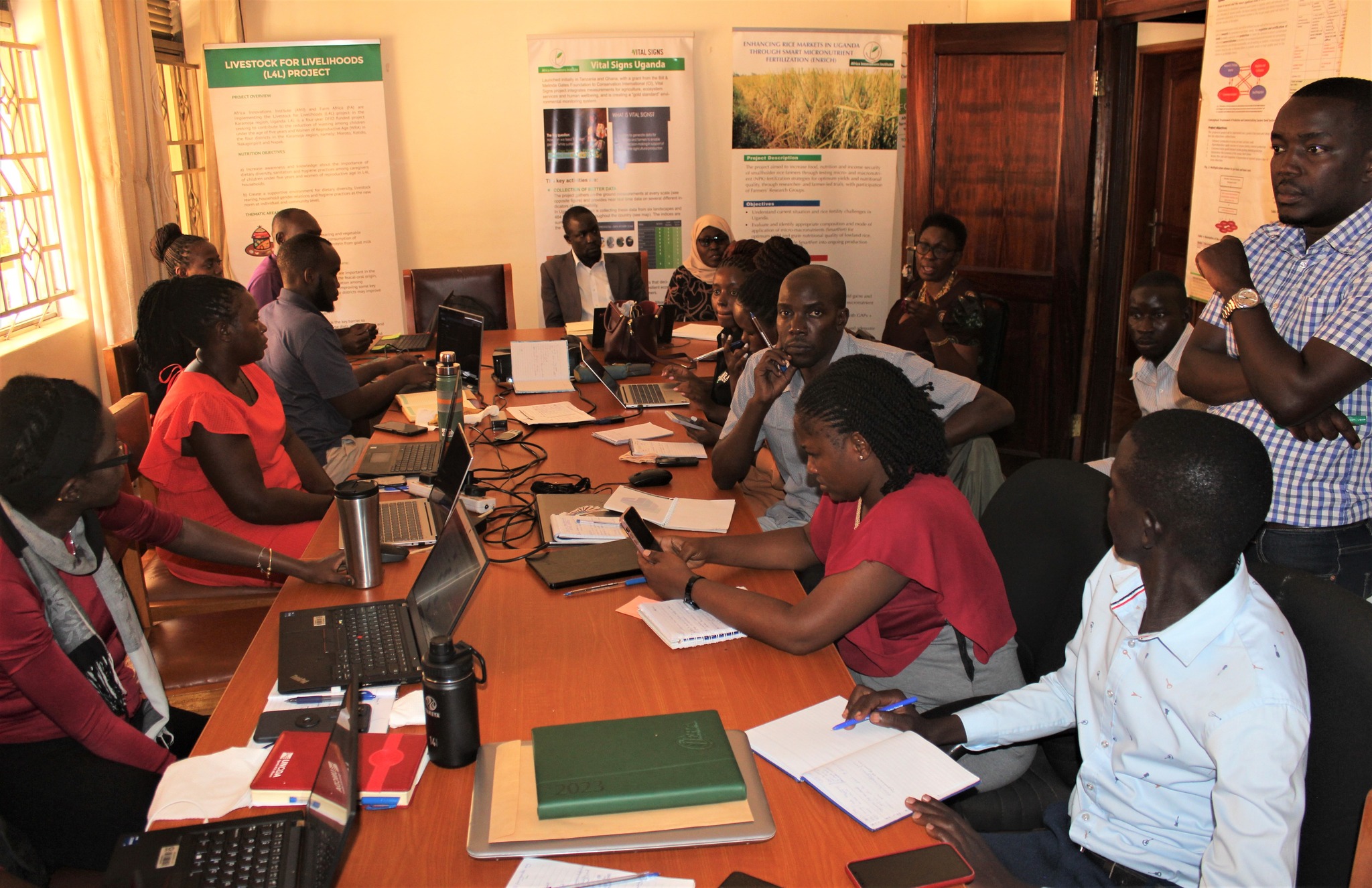
(By the door) Ms. Agnes Kirabo, the Executive Director-Food Rights Alliance addresses participants.
Tuesday 11th/04/2023 – The Africa Innovations Institute (AfrII) today hosted a project planning meeting to streamline and harmonize work plans and activities among partners to fast-track implementation of the CAtalyzing Strengthened policy aCtion for heAlthy Diets and resiliencE (CASCADE) project in the Karamoja, Acholi, and Tooro regions. Project partners from Food Rights Alliance (FRA), Kyambogo University (KYU) and AfrII presented their work plan for teams to explore areas of harmonization during the meeting being held in the AfrII Boardroom.
In attendance is AfrII CEO Prof. G.W. Otim-Nape, the Executive Director, Food Rights Alliance- Ms. Agnes Kirabo, The Project Coordinator-AfrII’s Dr. Muniirah Mbabazi, AfrII’s Nutrition and Innovations Manager for the CASCADE Project-Mr. Wilson Kirabira, Ms. Claire Atukunda-FRA Program Policy and Advocacy Manager, and other core project implementation team members from AfrII, FRA, and Kyambogo University.
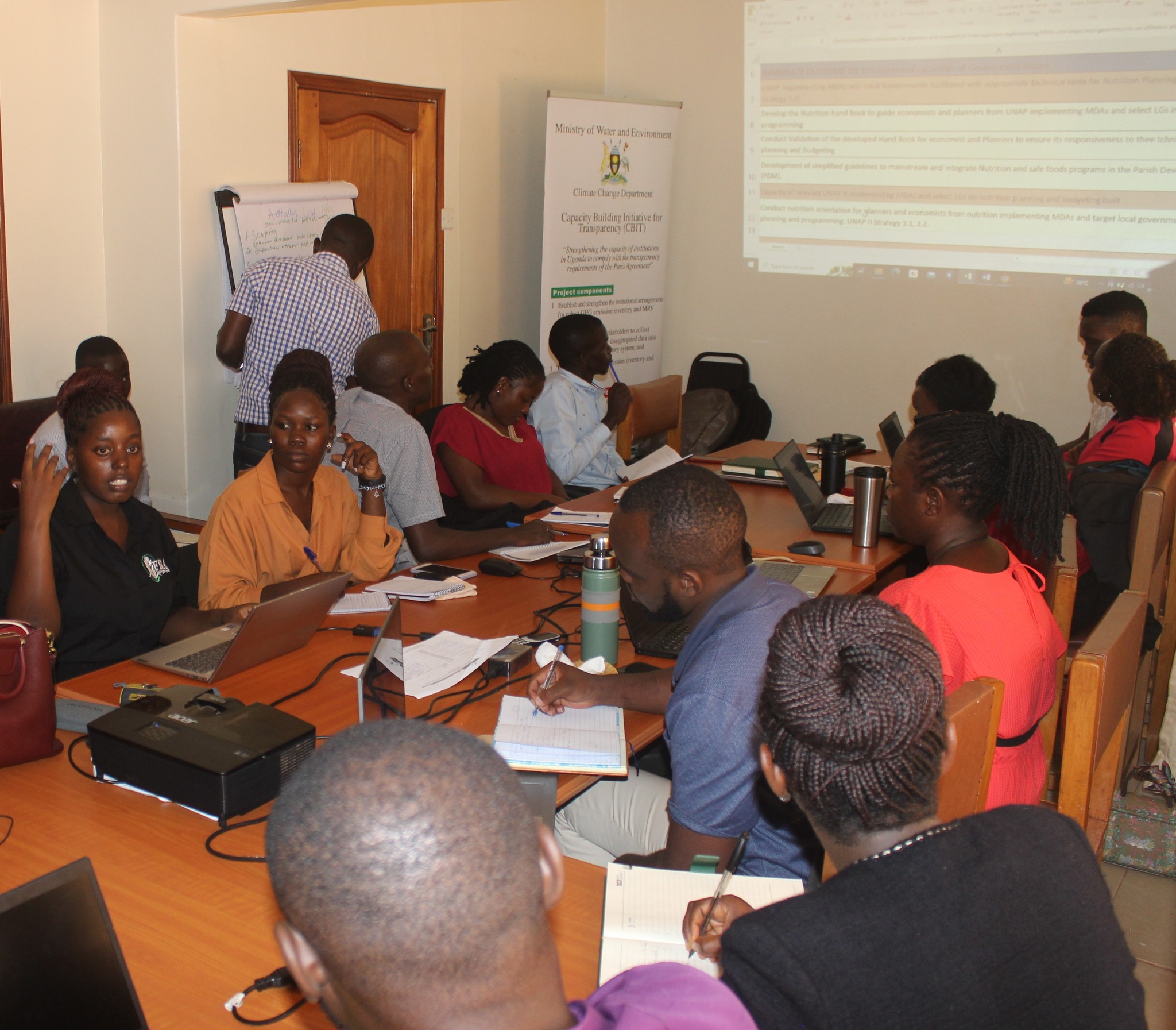
(Raised hand) Ms. Claire Atukunda-FRA Program Policy and Advocacy Manager briefs members during the meeting.
CASCADE is a multi-country project implemented in 6 countries in Africa including Uganda. The project aims to improve food security and contribute to the reduction of malnutrition of at least 1 million Women of Reproductive Age (WRA) and Children in Benin, Ethiopia, Kenya, Nigeria, Mozambique, and Uganda. In Uganda, CASCADE will be implemented in a selected 15 districts in the Acholi Region, Tooro region, and the Karamoja Region. These districts were selected owing to the high levels of malnutrition, poverty, and displaced populations. The CASCADE will be aligned with the Nutrition for Growth (N4G) commitments and Uganda’s UNFSS pathway to transform food systems and seeks to operationalize actions deemed to reduce malnutrition among women and children in the Uganda Nutrition Action Plan II (UNAP II). Under CASCADE, AfrII will implement domain 4 which seeks to strengthen women’s capacities to benefit from nutrition-related policies by enabling them to produce, prepare and consume healthy diets. Specifically, AfrII will implement strategic actions that seek to;
- -Increase women’s access to and control over resources to produce, prepare and consume healthy diets
- -Strengthen knowledge and skills of women small-scale producers on producing, preparing, and consuming healthy diets;
- -Increase households’ knowledge, attitudes and practices in nutrition and WASH specifically, food safety.
- -Support local agriculture extension systems with tools and modules promoting healthy diet preparation and consumption among female small-scale producers,
- -Support programmes aimed at improving nutrition outcomes of vulnerable populations and the organization of behavior change campaigns.
The CASCADE Project is funded by the Netherlands Ministry of Foreign Affairs through Care International
AfrII expands operations into Southern Africa under her new project ‘Agricultural Productivity Programme for Southern Africa’
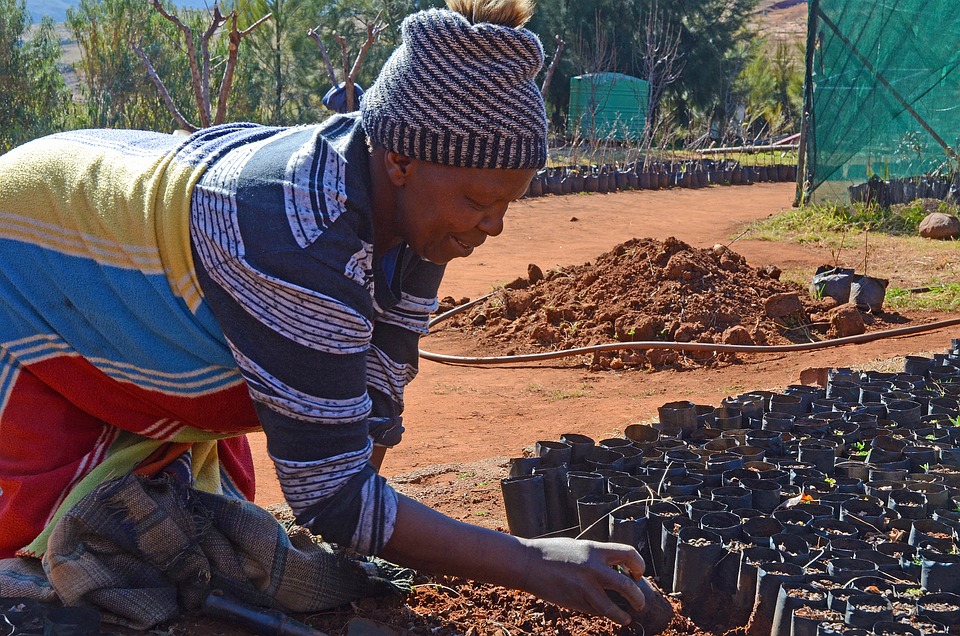
A female farmer in Lesotho happily tends to her nursery in preparation for planting.
Monday 6/02/2023 – The Kingdom of Lesotho’s Ministry of Agriculture and Food Security through the Department of Agricultural Research (DAR) has contracted a team of experts from the Africa Innovations Institute (AfrII) to deliver consultancy services for the joint ‘Agricultural Productivity Programme for Sothern Africa’ project. The consultancy will develop the Kingdom’s National Agricultural Research Policy including a clear road map and a business model for establishing a DAR semi-autonomous Institute for Agricultural Research; the development of the national science /research agenda and the national research and technology development strategic plan for an efficient implementation of the National Agricultural Research Policy.
The Uganda team led by the AfrII CEO, Prof. George William Otim-Nape will develop strategies and working policies to strengthen the National Agricultural Research System of Lesotho through research and innovations development. The consultants will produce and deliver documents including Inception report, Situation Analysis, Road map with narratives of the scenarios and change management strategy, a draft policy, draft National Agricultural Research and Development Strategy, draft Business Model for semi-autonomous DAR, and draft Instructions for the National Agricultural Research Act. They will work closely with different Government Ministries, national and regional institutions and donor and partner organisations that play a major role in the agricultural research arena.
The team of Uganda professionals with strong background in agricultural research and innovations systems and organizational development background was selected following a vital transparent screening process to conduct this consultancy. The Uganda team leader, AfrII’s Prof Otim-Nape is a celebrated plant virologist and former Director General of Uganda’s National Agricultural Research Organisation (NARO 2002-2005). During his tenure, he was instrumental in cementing the national research component; he established, directed and coordinated the operations of 12 Zonal Agricultural Research and Development Institutions (ZARDIs) located countrywide. Prof. Otim-Nape has 20+ years’ experience in agricultural research and innovations.
The consultants were recently engaged in a stakeholder’s validation workshop organized by the Department of Agricultural Research – DAR in the Ministry of Agriculture & Food Security, Kingdom of Lesotho, to share results from the Situation Analysis conducted. The team had close to a month long stay in Lesotho, and were engaged in a series of activities including conducting a situation analysis to identify major challenges and constraints, opportunities and a clear vision for the functional and effective national agricultural research system/innovation system. They will develop policy documents based on the outputs of the situational analysis and scenario whereby a clear implementation framework is proposed with targets and milestones for monitoring the policy enactment and its successful implementation; develop a science agenda for Lesotho, a clear roadmap and strategic plan for implementation of the policy recommendations for efficient and functional NARS, and also develop a national agricultural research policy. To this effect, a complete Situation Analysis report will then be submitted to the kingdom for further action.
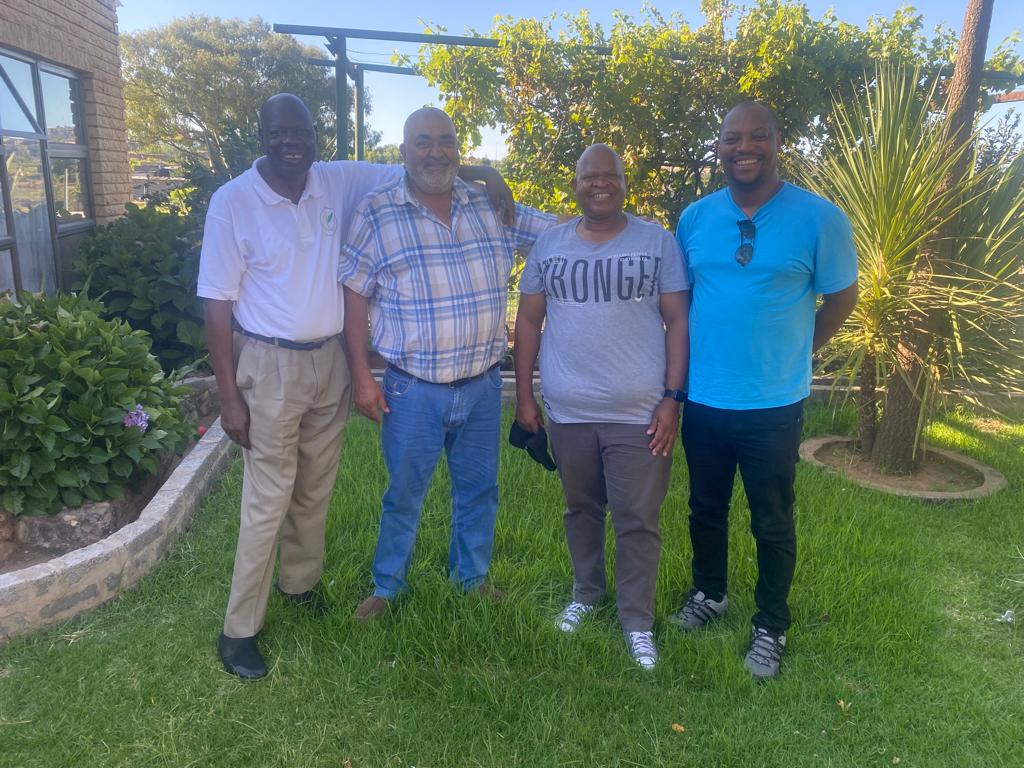
AfrII’s Prof. Otim-Nape (left) poses with friends from the Ministry of Agriculture and Food Security -Lesotho during his recent work stay in Lesotho
Background on the National Agricultural Research System of Lesotho
The Department of Agricultural Research (DAR) is one of the institutions that constitute the National Agricultural Research System (NARS) and is the apex research organization in the country expected to contribute significantly to economic growth through introduction, generation, adaptation, application and transfer of improved technologies. Alongside, the DAR is the National University of Lesotho which contributes significantly to research in the agricultural sector through student and academic research projects and initiatives in the crop and livestock sub-sectors.
Despite the various lined departments that constitute the DAR, it has however been shown that the research system has not been able to contribute efficiently and effectively to the achievement of the desired growth of the agricultural sector du e to inherent weaknesses of the DAR, which is to play a leading and coordination role in the NARS. Weak linkages between agricultural research output (by research organizations and academia) extension services and farmers have also been highlighted in previous initiatives. The NARS including DAR have been operating over the past years in a complete vacuum as far as research policy and regulatory framework is concerned. This is largely due to the fact that there is no national research policy and legal framework that sets the basis for the national research agenda. This vacuum has led to absence of efficient and effective efforts for research by the National Agricultural Research System and the associated organizing framework for the system. With regard to policy decision support systems, it appears that to a large extent, policy decisions on NARS-related issues are made without the benefit of proper processes and often not supported by regulatory frameworks. The establishment of DAR itself as a key component of the NARS was made with neither Policy nor legislation, resulting in a situation where the department has responsibilities with no authority, which would have been provided through legislative framework. It’s against the foregoing background that the establishment of a semi-autonomous National Research Institute/Council is being recommended to address the desire of the Government of Lesotho to have an agricultural research system that responds to the needs of stakeholders and contributes to poverty alleviations as well as drive economic growth through robust Innovation Systems that embrace the concept of Integrated Agricultural Research for Development (IAR4D). Such a system should not only exist by name but should be fully functional and well-coordinated with clear policy direction and mandate (national agenda) on research. It needs to be properly networked and should facilitate collaboration with national, regional and international research organizations for acquisition and dissemination of knowledge and technologies for the benefit of the farming communities and their advisory service providers.
AfrII and partners strategize to meet expected country targets towards the global nutrition-focused CASCADE project
Wednesday 1/02/2023 – The Africa Innovations Institute (AfrII) and partners from CARE International-Uganda have resolved to hold weekly project planning meetings to facilitate the fast-tracking and efficient implementation of the CAtalyzing Strengthened policy aCtion for heAlthy Diets and resiliencE (CASCADE) Project activities. This resolution, among others, was reached during a joint meeting yesterday at the AfrII premises in Bukoto, convened to discuss fast-tracking CASCADE implementation activities in Uganda. During these meetings, AfrII shall share updates on the progress of activities to ensure deadlines are met on time but also re-assess where changes need to be made. The outgoing Consortium Manager- CARE International in Uganda, Ms. Anja Feijter noted, a series of other meetings have been scheduled between CARE International –Uganda and the different partners on the project to check the progress of each regarding project activity implementation.
CASCADE is a multi-country project implemented in 6 countries in Africa including Uganda. The project aims to improve food security and contribute to the reduction of malnutrition of at least 1 million Women of Reproductive Age (WRA) and Children in Benin, Ethiopia, Kenya, Nigeria, Mozambique, and Uganda. In Uganda, CASCADE will be implemented in a selected 15 districts in the Acholi Region, Tooro region, and the Karamoja Region. These districts were selected owing to the high levels of malnutrition, poverty, and displaced populations. The CASCADE will be aligned with the Nutrition for Growth (N4G) commitments and Uganda’s UNFSS pathway to transform food systems and seeks to operationalize actions deemed to reduce malnutrition among women and children in the Uganda Nutrition Action Plan II (UNAP II). Under CASCADE, AfrII will implement domain 4 which seeks to strengthen women’s capacities to benefit from nutrition-related policies by enabling them to produce, prepare and consume healthy diets. Specifically, AfrII will implement strategic actions that seek to;
- -Increase women’s access to and control over resources to produce, prepare and consume healthy diets
- -Strengthen knowledge and skills of women small-scale producers on producing, preparing, and consuming healthy diets;
- -Increase households’ knowledge, attitudes and practices in nutrition and WASH specifically, food safety.
- -Support local agriculture extension systems with tools and modules promoting healthy diet preparation and consumption among female small-scale producers,
- -Support programmes aimed at improving nutrition outcomes of vulnerable populations and the organization of behavior change campaigns.

The CARE International-Uganda team led by the outgoing Consortium Manager, Ms. Anja Feijter (at the head of the table) during the CASCADE project planning meeting held in the AfrII Boardroom, Bukoto. AfrII’s CASCADE Project Coordinator, Dr. Muniirah Mbabazi (in blue headgear), and the Nutrition and Innovations Manager, Mr. Wison Kirabira (second on the right) in attendance.



